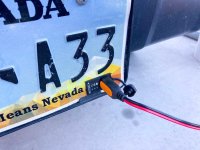Voltage alone, is not like a fuel gauge.
13.8v with the battery accepting 20 amps, is nowhere near fully charged.
13.8v with the battery accepting 0.1 amps could mean the battery is 99%+ charged, but really one would need to see how much amperage the battery is accepting at 14.4 ish volts to say with more confidence the battery is 99%+ charged.
Voltage readings as displayed by the dashboard might be inaccurate as to a voltage reading at the battery terminals
Voltage readings at the battery terminals, might be influenced by draws on the battery, with the doors or hood open.
Voltage is electrical pressure, and stating that 13.8v can never fully charge a battery is unwise, and untrue.
13.8v will take longer than 14.4, but on a healthy battery it will just slow the rate of recharging.
it is on an older/ abused sulfated battery where 13.8v has no chance of returning the battery to its truly fully charged state where the specific gravity in all the cells is at its maximum.
Battery voltage is also affected by temperature.
it is true that vehicles don't really care about achieving maximum battery longevity, though some seem to insist the voltage regulator is programmed to do exactly that, instead of maximizing potential fuel economy by reducing the alternator output, which is done by voltage regulation.
It is a great idea to plug in and try and bring the battery to a true full charge, or as high as their charging source can achieve, but many people seem to equate a single voltage reading with state of charge or state of health, when voltage by itself is only a small part of the equation.
One needs to know how much voltage the battery is maintaining, when powering a load. how much amperage is it providing to that load. 0.5 amps or 180 amps to crank the starter?
When charging is it accepting 55 amps at 13.8v, or 0.55 amps?
Without knowing amperage flow, a voltage reading by itself, can be extremely misleading.
Some vehicles will have a cylindrical ring sensor over one of the cables, which can determine amperage flow through that cable, and such a vehicle could, in theory, optimize battery charging for maximum longevity, but it is far more likely it is used to keep the battery around 80% charged, so that when it asks for higher voltages, often during braking/coasting, the battery can accept 20+ amps, as if it were fully charged, it would only accept 0.8 amps or so.
Every 25 amps the alternator has to make requires about 1 engine HP, so the load of the alternator can affect MPG's, and many auto makers have decided to sacrifice battery life, for MPG's , via their voltage regulation.
I suspect your voltage, if measured at the actual battery terminals, when driving, would change around from 12.8 to 14.8v depending on how fast you are moving and the load on teh engine.



